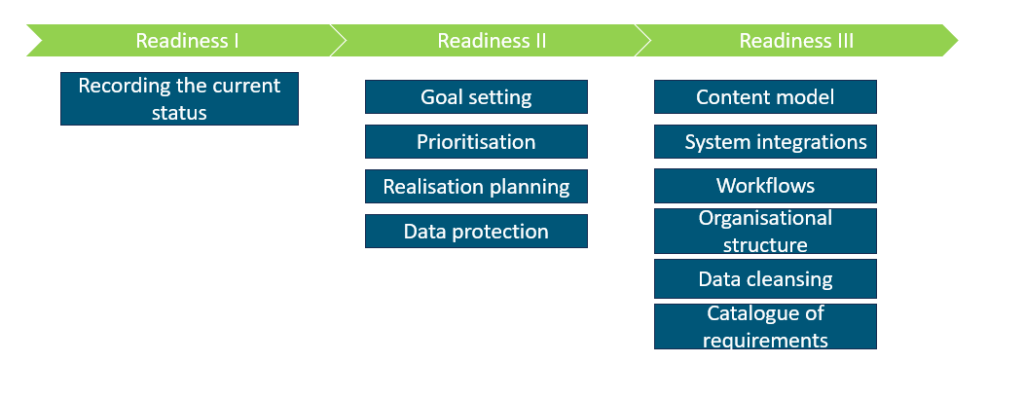CONSULTING
Our consultants show you new ways forward, create solutions, provide inspiration and new ideas. Whether it’s designing workshops on digitalization, preparing for product launches, preparing tenders, organizational consulting, system reviews, acting as a technical/content sparring partner, concept development and requirements analysis, end-to-end – we provide you with only experienced colleagues. Methodologically skilled.
Highly competent. Quality. Our consulting services can always be operationalized.
We work on a wide variety of consulting projects with universities, universities of applied sciences, research institutions, foundations and companies.
We operate sustainably and to a high standard of quality.
Knowing that consulting must not get bogged down in glossy slides.
Can’t find your topic or problem addressed below? Ask us!
AT-CRIS Consulting does not leave you with glossy presentations.
On the contrary, we accompany you in implementing our advice, if you wish. End-to-end. Across all phases, following our steps for successful product launch. Here is just a selection of situations and issues in which we have been able to provide support:
- Are you stuck with project implementation and unable to move forward?
- Do you need external support in project management to get your project back on track?
- Are you lacking a concept for solving a complex situation?
- Do you need ideas and new impetus?
- Do you need a market overview on a specific topic?
- Are you lacking an overview of data/processes/systems?
- What do you think of an independent product evaluation?
- Is the organizational structure in your systems inconsistent?
„Software does not rust.“
True, but the world keeps turning. What was up to date yesterday will be outdated tomorrow and may have security vulnerabilities.
Most of our customers do not need to concern themselves with software maintenance, as this is handled by the product manufacturers.
However, there are also customers who require highly specialised custom software that is not available of the shelf.
In these cases, we provide support in planning, preparing and implementing the software renewal:
- (Detailed) planning of agile software renewal.
- What exactly needs to be done?
- Defining the scope.
- What should the software architecture look like?
- What resources are required?
- Are organizational changes necessary?
- Optimisation and digitalisation of processes
- From ‘old’ to ‘new’ Migration and implementation planning
We also advise software developers on the implementation of new modules and solutions based on our knowledge of our customers’ needs.
Up-to-date and correctly maintained organizational management (OM) is a prerequisite for integrated information management. However, the master data used for organizational management in universities often does not meet the requirements of modern digital processes.
An inventory of organizational management and the mapping of the organizational structure in the IT systems in comparison with the goals pursued by OM provides the OM topics to be addressed in an institution. The following points should be given special attention:
- Consideration of the individual culture of the institution
- Involvement of stakeholders in the design of the OM concept
- Participation/role of the executive committee/rectorate in the OM project
- Definition, optimisation and digitisation of OM maintenance processes
- Design of the transition from old to new (migration plan)
- Identification/definition of follow-up projects
With professional preparation for a new software
- the duration of the implementation project is shortened
- conflicts with software manufacturers pushing for acceptance during implementation are reduced
acceptance of the new software solution is created early on in your institution.

As part of our Readiness Service, we prepare you for the software implementation:
- The acceptance of a new software solution has a lot to do with vision, target image and perspective. The necessary decisions should be made before you decide in favour of a product.
- We prepare your organisation for the use of the new software solution.
Processes are analysed and, if necessary, modified and improved. - Existing data and data required in the future will be analysed and prepared.
The quality-assured legacy data can then be migrated directly to the new solution. - New software solutions must be integrated into the existing IT infrastructure. We prepare the technical and functional specifications in such a way that the IT specialists can start with the integration directly after the decision in favour of the software solution.
- Data protection issues are already discussed during the readiness phase and ideally even clarified so that they do not become stumbling blocks later on, unnecessarily prolong the implementation project and possibly even block the go-live.
From our activities in the consulting and implementation business, we are familiar with the professional and technical requirements placed on software solutions.
AT-CRIS does not have its own software. Instead, we are happy to share our knowledge with you and advise you on the implementation of new modules and solutions. In doing so, we always align ourselves with the philosophy of your software.
- AT-CRIS does not act as a reseller for existing software products.
- AT-CRIS also does not benefit if someone decides to purchase a software product from company XY.
- AT-CRIS does not provide development resources for third-party products.
- If AT-CRIS implements open source software at a customer’s request, we contribute to its further development if this is necessary for the project with our customer.
We work with you to develop the perfect technical solution for your PBF and implement it together with you.
Whether it is the distribution of funds across the entire university to its departments/faculties or within the faculties or the justification of performance bonuses in W-salary scales, the calculation of LOM performance parameters is often based on factors such as supervised doctorates, courses taught, third-party funding acquired, publications, and many other parameters.
- AT-CRIS supports you in automating and digitizing your existing LOM processes.
- We work with you to define the parameters relevant for calculation and their weighting and specify the data model required to implement your PBF.
Together with your experts, we specify the interfaces required for system integration and support you in their implementation, if desired.
Every university interacts closely with its region and the people who live there. As teaching and research institutions, employers, service providers, and cooperation partners, universities are also active in the transfer of knowledge and technology.
Despite their regional integration and networking, universities are often unable to answer the question.
‘What activities at my institution fall under the heading of transfer / third mission / social mission?’
However, knowledge of one’s own transfer activities is the basis for actively managing the mission society and gaining competitive advantages. With this conviction, AT-CRIS has developed a holistic approach that allows universities to actively pursue the mission of society with IT support, thus not only finding answers to open questions but also actively creating added value for themselves and society.
Scientific institutions in Germany are currently faced with the challenge of deciding whether and, if so, how the KDSF should be implemented.
The basis for the decision should be an assessment of the current situation (see iFQ et al., Results report on the ‘Core Data Set Research’ project, 13 October 2015).
- As part of a three-stage assessment of the current situation (assessment, analysis, report), data availability and data quality, as well as data collection in terms of reliability, handling, and data protection, are examined.
- Based on this assessment, the need for action to implement the core data set for research can be identified and existing data collection processes optimized.
- In this sense, the assessment of the current situation is a quality assurance measure.
- that supports the scientific institution in ensuring data quality and availability for the KDSF in the long term with as little effort as possible.
The service is designed so that it can also be used as a research information system (RIS) for recording the current status. Based on the underlying methodology, we have already transferred the service for recording the current status to other areas.
You have implemented an RIS and have been operating it for some time. Changing internal and external conditions constantly present your system with new challenges.
Is your RIS operation running smoothly?
- Are you satisfied with your RIS implementation?
- Have you achieved all the goals you originally set out to achieve with the RIS implementation?
- Do you have a strategy to support future use cases with your RIS?
- How satisfied are your users, and how satisfied are you with your RIS?
- Is your RIS integrated into your IT infrastructure?
- Are you aware of the full potential of your RIS, and do you want to utilize it?
The offer
Commission an independent expert review of your FIS, which will examine its use and operation. Discover opportunities to optimize your system and exploit (as yet) untapped potential.
- The 360° CRIS Review helps you identify use cases, services, and business processes that are not running smoothly.
- We advise you on optimization and untapped potential of your RIS.
- We analyze how changes in the scientific landscape affect your RIS.
- (e.g., new tasks/requirements, open science, evaluations, initiatives, accountability, and budget cuts).
- We examine the introduction to RIS use, training, and user satisfaction.
- We look at hosting, system upgrades, and the IT infrastructure.
- We check the data quality, data protection, and data security of your RIS.
- We support you in creating and prioritizing your plans for the further development of your RIS, including anchoring these plans in your institution.
Services & results of the 360°CRIS review
- Optimisation of your RIS operations
- Management of responsible parties and RIS users
- Determination/allocation of resources
- Development of a FIS roadmap
- Facilitation of decisions regarding your research information management
- Adjustments to business processes
- Identification of gaps to be closed

Your contact person
Dr. Wolfram Schüßler
Head of Consulting Services
Am Sandfeld 4
76149 Karlsruhe
